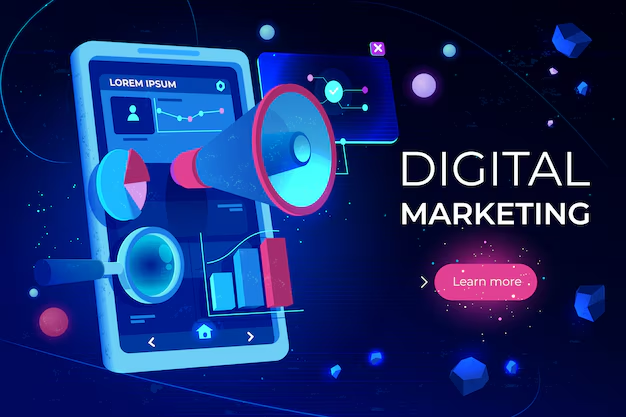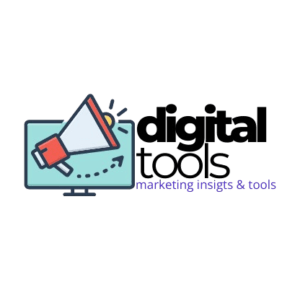
Table of Contents
Digital marketing is an ever-evolving field that offers limitless opportunities for businesses and individuals looking to grow their online presence. Whether you’re a seasoned entrepreneur or a complete beginner, 2024 is the perfect time to dive into this dynamic space. With more businesses shifting their focus to digital platforms, understanding how to navigate the digital marketing landscape is essential.
Here’s an in-depth guide on how you can start your digital marketing journey in 2024.

1. Understanding Digital Marketing: The Basics
Digital marketing refers to all marketing efforts that use the internet or electronic devices. It encompasses a variety of channels such as search engines, social media platforms, email, and websites to connect with potential customers.
Key Components:
- Search Engine Optimization (SEO): Enhancing your website’s visibility on search engines.
- Content Marketing: Creating valuable content to attract and engage audiences.
- Social Media Marketing: Using platforms like Instagram, Facebook, and LinkedIn to promote your brand.
- Pay-Per-Click Advertising (PPC): Paid ads that appear on search engines and social platforms.
- Email Marketing: Sending targeted emails to nurture relationships with potential and existing customers.

2. Creating a Digital Marketing Plan
Starting digital marketing without a strategy is like navigating without a map. Begin by setting clear goals, whether it’s increasing website traffic, generating leads, or boosting sales.
Steps to Develop Your Plan:
- Identify Your Target Audience: Know who you’re marketing to. Create buyer personas that represent your ideal customer based on demographics, behavior, and needs.
- Set SMART Goals: Goals should be Specific, Measurable, Achievable, Relevant, and Time-bound. For example, “Increase website traffic by 20% in 6 months.”
- Select the Right Digital Channels: Choose the channels that align with your audience. For instance, younger audiences may be more active on TikTok and Instagram, while professionals might prefer LinkedIn.
- Budget Allocation: Determine how much you’re willing to spend on digital marketing. Remember to allocate funds for tools, ads, and possibly outsourced services like design or copywriting.

3. Learn Essential Digital Marketing Tools
Familiarizing yourself with key tools is vital to success. Digital marketing tools will help you track performance, analyze competitors, manage campaigns, and streamline tasks.
Must-Know Tools:
- Google Analytics: For tracking website traffic and user behavior.
- SEMrush/Ahrefs: Powerful tools for SEO analysis, keyword research, and competitor insights.
- Hootsuite/Buffer: Social media scheduling and management platforms.
- Mailchimp: A tool for designing and managing email marketing campaigns.
- Canva: A simple graphic design tool for creating visuals for social media and blog posts.
4. Building an Online Presence
If you don’t have a strong online presence, your digital marketing efforts won’t yield results. Start by creating a professional website that showcases your services, products, or brand.
Steps to Build Your Online Presence:
- Create a Website: Your website should be easy to navigate, mobile-friendly, and optimized for SEO.
- Optimize for SEO: Make sure your website ranks high on search engines by including relevant keywords, optimizing images, and ensuring fast load times.
- Claim Social Media Accounts: Secure your brand name on platforms like Facebook, Instagram, LinkedIn, and Twitter.
5. Content Creation: The Heart of Digital Marketing
Content is at the core of every digital marketing strategy. Whether it’s blog posts, videos, infographics, or social media updates, quality content engages and converts your audience.
Tips for Creating Engaging Content:
- Consistency: Publish content regularly, whether it’s daily, weekly, or bi-weekly.
- Value-Driven: Focus on providing solutions to your audience’s problems.
- Multimedia: Combine text, images, and video to appeal to different types of learners.
- User-Generated Content: Encourage your audience to share their experiences with your product or service.

6. Leverage Social Media Marketing
Social media is an excellent platform for building brand awareness and connecting with your audience. In 2024, platforms like Instagram, TikTok, and LinkedIn will continue to dominate the marketing space.
Social Media Tips:
- Post Regularly: Keep your audience engaged with frequent updates.
- Use Hashtags: Use relevant hashtags to make your posts more discoverable.
- Engage with Your Audience: Reply to comments and messages to build relationships.
7. Email Marketing: Building Relationships
Email marketing remains one of the most effective ways to nurture leads and convert them into customers. It’s cost-effective and can be highly personalized.
Best Practices for Email Marketing:
- Segment Your Audience: Send tailored messages to different segments of your audience based on their interests and behavior.
- Use Engaging Subject Lines: Your email’s subject line determines whether it will be opened or ignored.
- Include a Clear Call-to-Action (CTA): Every email should have a purpose, whether it’s signing up for a webinar or purchasing a product.
8. The Power of Analytics
Data is at the heart of digital marketing. Track, analyze, and adjust your strategies based on the results.
Key Metrics to Track:
- Website Traffic: Measure how many visitors come to your site and where they come from.
- Conversion Rate: Understand how many visitors are completing desired actions, like making a purchase or filling out a form.
- Bounce Rate: Track how many visitors leave your site after viewing just one page.
- Email Open Rate: Measure the percentage of recipients who open your emails.
9. Stay Updated with Digital Marketing Trends in 2024
The digital marketing landscape is always changing. To stay ahead of the competition, keep yourself updated with the latest trends and technologies.
Key Trends for 2024:
- AI-Powered Marketing: Tools like ChatGPT can help automate customer support and content creation.
- Short-Form Videos: TikTok and Instagram Reels will continue to dominate.
- Voice Search Optimization: With the rise of smart speakers, optimizing for voice search will become crucial.
- Personalization: Tailor your marketing efforts to individual users for better engagement.

10. Continuous Learning: Never Stop Evolving
Digital marketing is a vast field with constant updates. To excel, you need to continuously learn and adapt. Join webinars, read blogs, and consider enrolling in a digital marketing course to stay relevant.
Popular Learning Resources:
- BrainStation: Offers digital marketing bootcamps and training.
- Coursera: Provides a wide range of courses for beginners and professionals.
- HubSpot Academy: Free courses on inbound marketing and sales.
Final Thoughts: The Future of Digital Marketing in 2024
Starting your digital marketing journey in 2024 can be an exciting and rewarding experience. With the right tools, strategies, and mindset, you can create impactful campaigns that drive growth and brand awareness. Always remember that digital marketing is not a one-size-fits-all approach; experiment with different tactics, learn from your failures, and optimize your strategies for success.
Digital marketing is about being flexible, data-driven, and ready to adapt to new technologies. The key to success lies in staying proactive and continuously learning to keep up with the fast-paced world of digital marketing.

Add a Comment